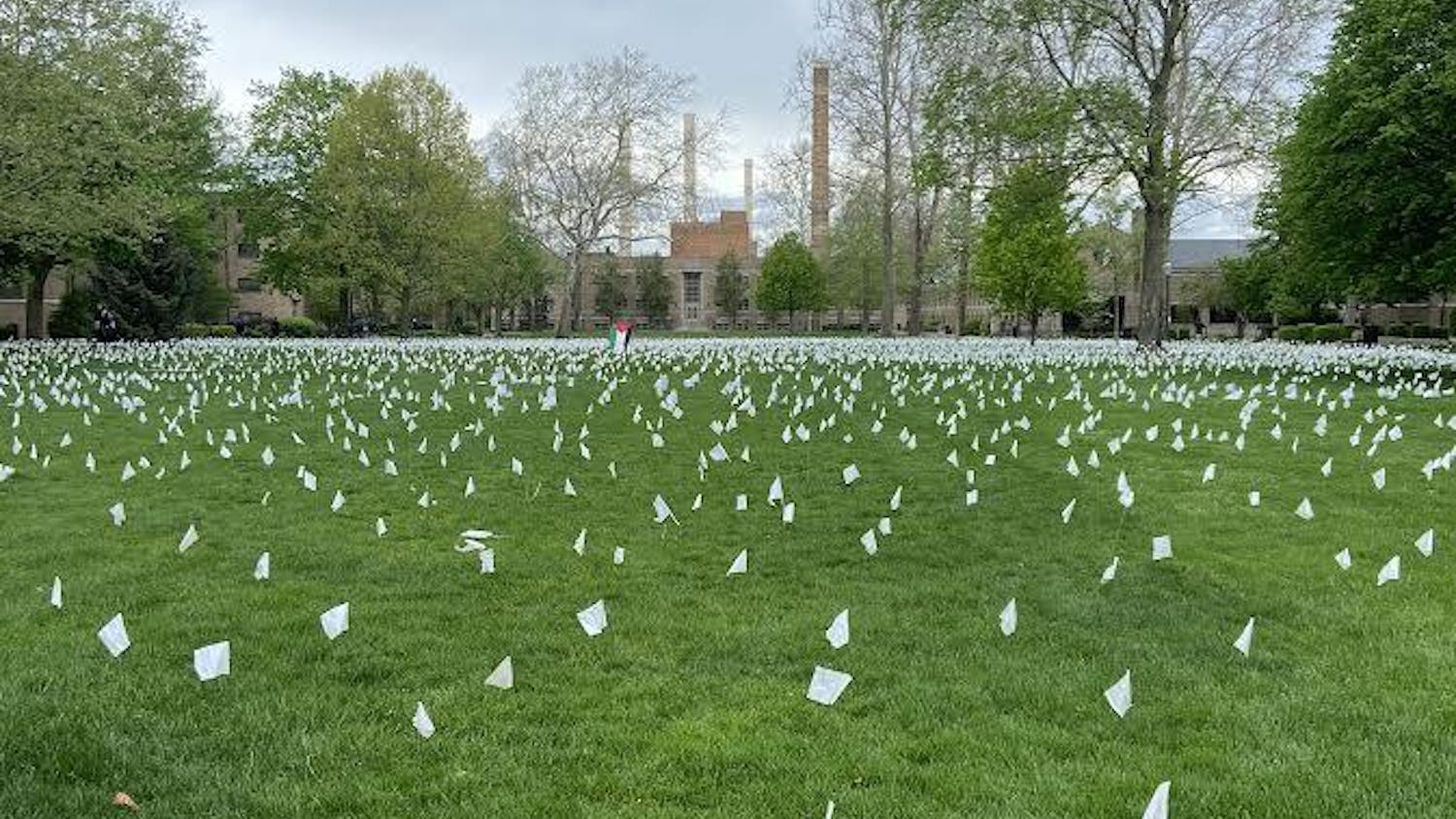In October 2010, Sudanese bishops visited Notre Dame 100 days before a referendum vote in which citizens of southern Sudan would be able to decide whether they wanted to secede from the north.
The delegation of the Sudan Conference of Catholic Bishops sought to reach out to the Catholic community in the U.S. to ensure a peaceful resolution after more than half a century of conflict.
“Notre Dame became a part of the story of the formation of South Sudan,” said former student body president and Master of Global Affairs (MGA) student Elizabeth Boyle ’20.
Two months later, the Notre Dame student government and the Fighting Irish men’s basketball and men’s lacrosse teams organized “Playing for Peace,” a 3-on-3 basketball tournament followed by a rally for peace in Sudan.
University President Emeritus Fr. Hesburgh attended both, and then accompanied student leaders on a visit to Washington, D.C., in January 2011. There, they met with policymakers and advocated for peace.
South Sudan was founded six months after that, in July 2011.
Over a decade later, on Thursday, Boyle joined a virtual and in-person discussion with Andrea Bartoli, president of the Sant’Egidio Foundation for Peace and Dialogue. The talk focused on the organization’s role in the peace process in South Sudan, which has endured civil war since 2013.
Sant’Egidio is an affiliate of the Catholic Peacekeeping Network (CPN), which is housed in the Kroc Institute and the Keough School and seeks to strengthen the study and practice of Catholic peacebuilding.
Their faith-based approach to peace, evident in their work in Mozambique and Algeria, has earned Sant’Egidio recognition as a leader in Track 2 diplomacy.
Now, Sant’Egidio is bringing South Sudanese groups who did not sign the 2018 regional peace agreement into the current peace process — “striving [for] a system where everybody is included,” Bartoli said.
“So, it’s a very technical piece, a very tiny piece,” he added. “But it’s important because it sends a signal that the political process is still alive, that peace is still possible, that it is possible to imagine a South Sudan where the South Sudanese themselves are actually in charge of their own peace — excluding nobody.”
And this capacity for inclusiveness lies in people’s hearts, Bartoli said. On the cross, for example, the Good Thief asked Jesus to remember him when he went into his kingdom.
“He demonstrates that friendship, the human space where the Spirit speaks, is always possible,” he said.
Boyle joined the talk over Zoom from Rome, where she is serving as Sant’Egidio’s South Sudan project director for her field immersion experience in the MGA peace studies concentration.
“The Rome initiative, up until this point, has really been focused on the high-level political dialogues that most definitely need to happen to bring these non-signatory groups to the table,” Boyle said during a question and answer session at the end of the talk.
Echoing Bartoli’s sentiments, Boyle said peace in South Sudan will not come “until it is owned by and driven completely by the people of South Sudan.”
Sant’Egidio’s work is thus key in moving this process forward in an inclusive, sustainable way. For instance, Sant’Egidio recently facilitated workshops and dialogues in tandem with and at the South Sudan Council of Churches in Juba, which included Christian and Muslim religious leaders, civil society leaders and women leaders, Boyle said.
‘Everyone can be a little bit more of a peacemaker’
The Observer interviewed Bartoli and Boyle about the role lay people and students can play in keeping, making and building peace, particularly through their faith.“If there is anything that I hope this first encounter will do is to strengthen the discipline of self-reflection. Ask yourself: Are you doing what you can to serve peace today?” Bartoli said during his talk. “Are you sure that you’re using all your talents, all your connections, all your knowledge, to help somebody who is not in peace to move a little closer to peace?”
Sant’Egidio grew out of a dedication to receive the Gospel and act on the Gospel, Bartoli told The Observer.
“So, the idea is that each of us actually has personal skills, personal qualities, personal gifts, that could be used for the good of all and it’s good to be invited to believe in these skills, believe in these options and develop our peace potential,” Bartoli said.
One way to develop that potential is through prayer. On Friday, Bartoli and Boyle led a prayer for peace with a group of students.
“The hope with the prayer for peace is that it’s something that could grow organically by any student who’s interested in taking it up,” Boyle said. “... I joked that you don’t need SAO approval to start a prayer for peace; not everything has to be so bureaucratic or club-oriented to be established.”
A prayer for peace on campus, she said, could be as simple as a group of students getting together however frequently they feel called to do so in order to sit together, read the Gospel, reflect on it and say a prayer for those countries at war.
“There’s a great need for peace in South Sudan, but there’s also a great need for peace in South Bend, and there’s violence in our own communities,” Boyle added.
In order to be a force for good in the world, she said, students have to realize they don’t need to start another club. They just have to be willing to learn from each other and their communities.
“Peace might sometimes seem daunting and impossible, but it’s just as easy as sitting down with a friend,” she added.
Boyle considered the role of Catholic Social Teaching in informing the peacekeeping work Sant’Egidio and other lay Catholics are called to carry out in the world.
“Catholic Social Teaching at its best is when it’s the Gospel in action,” she said. “And that’s where peace comes into it. Because inherently, religions are a call for peace — peace through love, through solidarity, through friendship with each other. And at Sant’Egidio, in our smallest of ways, we’re just trying to live out that Gospel a bit more truly.”
Students can get involved with Sant’Egidio locally through Cardinal Nursing Home in South Bend, where the community has been present for over 20 years. They can also contact the foundation through their website for other ways to get involved.













